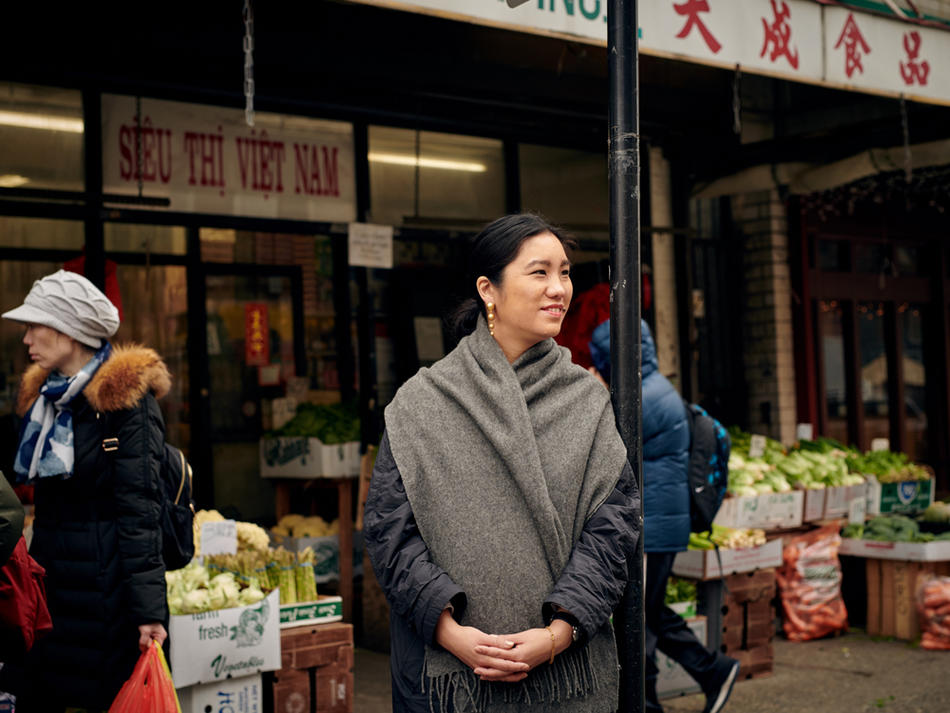LinYee Yuan ’02CC knows that the title of her magazine, Mold, isn’t exactly a crowd pleaser. It’s unusual, even off-putting. And that’s exactly how she likes it. “I wanted it to be very clear that this publication is not going to be full of recipes or photos of perfect-looking dishes,” she says. “Mainstream magazines treat food as a commodity, or as a luxury. That’s the opposite of what I wanted to achieve with Mold.”
Rather, Mold is focused on the future of food, covering innovative ideas from the design and tech worlds that have the potential to change the way we eat. In the most recent issue, which is organized around the theme of waste, she highlights designers who are using food byproducts to create new materials, like a bioplastic made entirely of artichokes that will be used to package fruits and vegetables. Another article features a startup that has created a plant-based coating that delays spoilage in produce, literally using waste to reduce future waste.
There’s plenty of fodder for foodies, including a report from the fermentation lab at the legendary Copenhagen restaurant Noma. But these articles are less concerned with gourmet fare than with the creative ways the proprietors are finding to be responsible food producers. At Noma, for example, fermentation experts talk about how their job “often begins in the garbage bin.” They use the scraps that might be discarded in another kitchen and turn them into vinegars, pickles, and other condiments.
The ethos of respecting food was ingrained in Yuan from the time she was a child growing up in Houston. “No one talked about it in environmental or even explicitly economic terms, but I was taught that food was not to be squandered,” she says. Yuan’s mother was a dietitian and her father an amateur gardener and fisherman. “We were eating seasonally and locally before it was cool,” she says.
At Columbia, Yuan majored in Asian-American studies and also interned at Harper’s Bazaar and Asian Avenue, a very early social-networking site. After a short stint teaching in Asia, Yuan landed her dream job at the Fader, a magazine covering music, style, and culture. “Working there showed me that magazines have the potential not only to comment on but to change society,” she says.
From there, Yuan bounced around — working for a streetwear company, then at a magazine devoted to Asian-American culture, and even running her own barbecue pit at a Brooklyn flea market — before she was hired in 2010 as an editor at a design website called Core77. “Working there was basically a crash course in industrial design,” she says. Through Core77, Yuan started attending design conventions and was inspired by several projects on food design — everything from refrigerators that alert you when your food is about to spoil to edible food packaging made from seaweed.
Yuan had already been thinking about starting her own website devoted to food design when in 2012 she heard a statistic that stopped her in her tracks. “The UN released a report saying that if we continue to produce and consume food the way we do now, we’ll essentially run out by 2030.” Yuan says that the terrifying prediction gave her magazine an organizing principle. “There was this huge and obvious problem, and it seemed like no one was looking to the design world to solve it,” she says.
Though Yuan had initially conceived of Mold as a website, she realized that there was value in the print medium. In 2017, she launched a Kickstarter campaign to help her fund six biannual issues. She raised more than $35,000, which allowed her to print five thousand copies of each issue and to hire a freelance designer, though she remains the only full-time staff member.
“In industrial design, a mold is an object that gives things a new form. In food production, mold is an agent for change — it’s how we get things like cheese. We turn what’s old into something fortifying and delicious,” Yuan says. “I think my magazine does the same thing, except with ideas.”
This article appears in the Spring 2019 print edition with the title "Eater's Digest."



